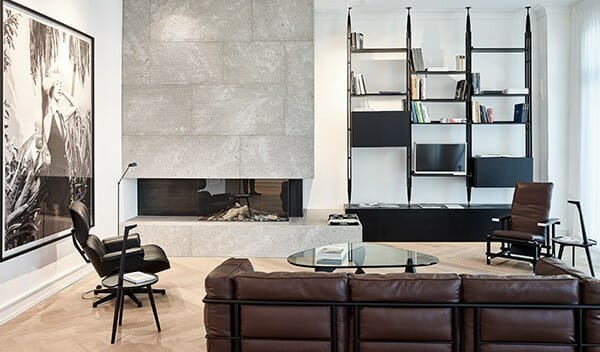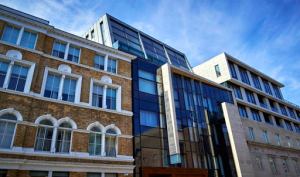
A heritage-listed landmark in the center of the old town, The Qvest has long established itself as a Cologne classic with its neo-Gothic architecture and museum-worthy collection of modern design and art. And thanks to the introduction of two exclusive townhouses, hotel guests are now able to experience the city through the eyes of a local.
Located to the rear of the hotel in a leafy, gated community, the townhouses are defined by a sleek, restrained aesthetic conceived by The Qvest’s owner and Original Michael Kaune. The simplicity of the interiors creates the perfect backdrop to the townhouses’ remarkable collection of contemporary photography, which includes works by George Holz, Jo Fober, and Stefan Heyne. Spanning 175 – 213 square meters, the townhouses comprise two bedrooms, living room, kitchen, and three bathrooms, furnished with a roll call of iconic design pieces from the likes of Vitra, Cassina, Pallucco, DCW Éditions, Gubi, Tom Dixon, and Flos. Overlooking the community’s beautifully landscaped gardens, the townhouses are available to book individually or as separate suites—offering an exquisitely peaceful urban retreat in the heart of Cologne.

Liverpool’s original boutique hotel to complete a transformative development in Spring 2020
One of Liverpool’s most iconic independent brands, Hope Street Hotel, is to complete its transformative development in Spring 2020. The city’s original boutique hotel is extending into and building upon the adjacent 1931 Grade II-listed premises, originally The Royal School for the Blind, seamlessly combining some of Liverpool’s finest old buildings with a contemporary guest experience. This will mark the independently owned hotel’s second expansion since opening in 2004 and will bring more of its unique offering to the city, demonstrating Hope Street Hotel’s continued role in the regeneration of Hope Street and Liverpool’s Georgian Quarter.
With distinctive and complex architecture alongside sympathetic interior design, Hope Street Hotel’s new development will add 62 top category rooms including 15 suites, a clubroom, a new gym, and an extensive spa, called Hope Street Hotel Spa, which will include an indoor swimming pool and indoor-outdoor vitality pool. There will also be Liverpool’s first hotel cinema with 40 seats and its own bar – a room with exposed pitch pine roof trusses, six arched 1851 windows, and Cheshire Pink brick walls. A new fifth-floor event space which will have two terraces – one overlooking the city centre and the other over the Metropolitan Cathedral.
Opened and developed by Dave Brewitt, a local resident since 1981, Hope Street Hotel has grown three-fold in the last 15 years, and has become a firm favourite for locals and visitors to Liverpool alike. The newest project has been a complex refurbishment and new-build extension, striking a balance between aesthetics and economy, bringing together the buildings from four different eras, over four different footprints and resulting in just over 30 different floor levels. A neglected yet integral part of the city’s heritage, moulding the original School for the Blind to be part of Hope Street Hotel has required detailed architecture to thread a new eight-storey building over, under and alongside the listed structure and businesses – Pizza Express and 92º coffee shop.
Internally, careful considerations have been made to ensure the two buildings flow seamlessly to create handsome public spaces in keeping with Hope Street Hotel’s current identity as the city’s original design-led hotel. The hotel’s simple design will evoke a sense of space that complements the original Victorian warehouse interior. Original features such as pitch pine beams, Victorian Cheshire pink and red Art Deco brick walls, Portland stone oak floors, cast-iron pillars and picture windows – seen in the original part of the hotel – will be elements carried through into each part of the new development.
The new developments are due to open in Spring 2020. For more information visit www.hopestreethotel.co.uk.
